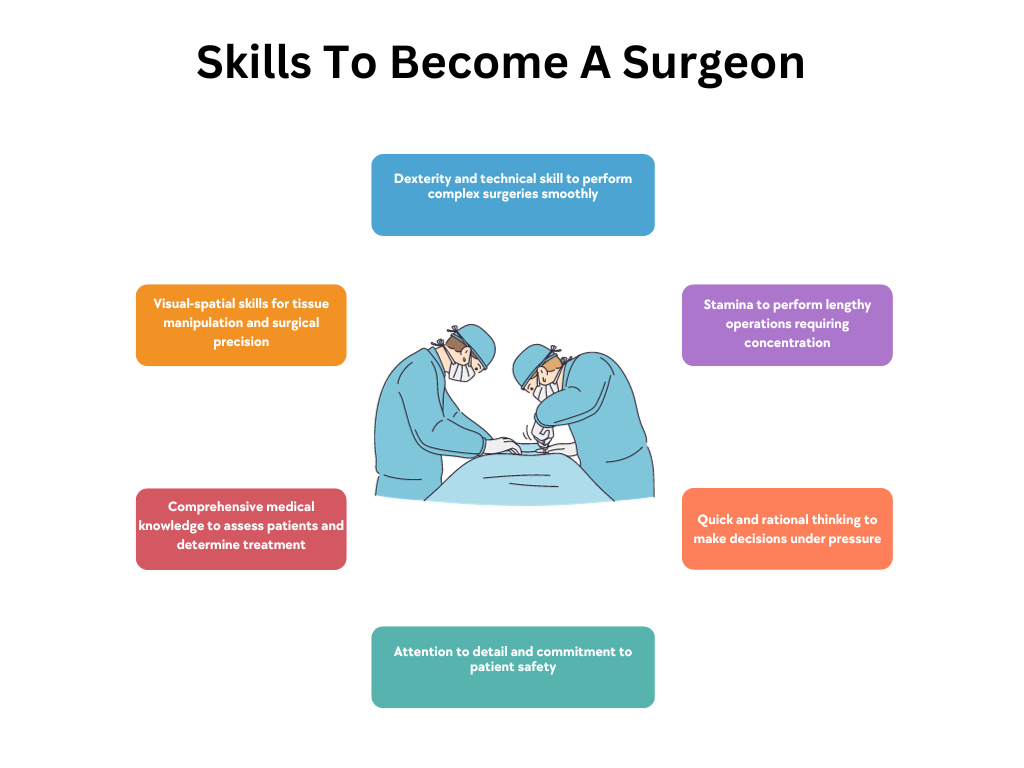Becoming a surgeon in India is a prestigious yet challenging career path that requires dedication and perseverance. Surgery is a complex and demanding profession, but also deeply rewarding. If you have a passion for science and helping people, a career in surgery may be right for you.
Table of Contents
How To Become A Surgeon In India
Here is a step-by-step guide on how to become a surgeon in India.
Educational Requirements
The first step is obtaining the proper education. You will need:
- A Bachelor’s degree in Medicine and Surgery (MBBS), which is a 5.5-year program after 12th grade. This provides comprehensive medical education and clinical rotations.
- A Master’s degree in Surgery (MS), which is a 3-year specialization program in a particular surgery field. This involves intense training under senior surgeons.
- Some surgeons pursue additional super-specialty fellowships for 1-2 years to sub-specialize further.
So the total education required is approximately 9.5-11.5 years after 12th grade. Gaining admission into medical college requires excelling in biology, physics, chemistry, and mathematics in 12th grade. You must pass medical entrance exams like NEET with a high rank. It’s highly competitive, so you need an excellent academic record.
Registration and Training
After completing your education, you need to register with the Medical Council of India (MCI) and respective State Medical Councils to practice medicine legally. Next, you must complete a 1-year compulsory rotatory internship at a recognized hospital to gain clinical experience.
This is followed by 2-3 years of junior residency, where you learn surgical skills under guidance. After clearing examinations, you can start independent surgical practice as a senior resident. However, most pursue further higher specialty training.
You can apply for competitive residency programs (like MCh) to specialize and hone advanced surgical skills over 3-5 years. This training is intensive, involving long working hours and high responsibility. You assist in hundreds of surgeries, study the latest techniques, and manage patients. Hard work and perseverance are vital.
After residency, you can appear for exams to become a certified surgeon in your specialty. Lifelong learning is essential to stay updated with new advances in the field.
Skills Required
Becoming a competent surgeon requires developing key skills:
- Dexterity and technical skill to perform complex surgeries smoothly
- Visual-spatial skills for tissue manipulation and surgical precision
- Stamina to perform lengthy operations requiring concentration
- Comprehensive medical knowledge to assess patients and determine treatment
- Quick and rational thinking to make decisions under pressure
- Communication skills to guide the surgical team and counsel patients
- Leadership qualities to manage operating rooms and mentoring juniors
- Attention to detail and commitment to patient safety
Surgery requires a calm & steady temperament, the ability to work under stress, and emotional stability when dealing with critical cases. Passion, discipline, and empathy are musts.
Career Prospects
There is an excellent demand for competent surgeons in India due to the rising healthcare infrastructure. Surgery has lucrative career prospects:
- Surgeons earn attractive salaries, averaging ₹8-25 lakhs annually. Senior consultants at top hospitals earn ₹50 lakhs+
- You gain immense respect and job satisfaction transforming lives through surgery
- Opportunities to teach medical students and train future surgeons
- Scope for research, academic pursuits, conferences, and publishing
- Potential to specialize further and become an expert in niche surgeries
- Options to work abroad at renowned hospitals after clearing licensing exams
- Can start an independent surgical practice or private hospital partnerships
Growth varies depending on reputation, capabilities, and city. With experience, surgeons can rise up the hierarchy to become heads of departments, directors, and deans at medical institutions.
Challenges Faced
Surgery is an intensely demanding profession. Some key challenges faced are:
- Long studies and training periods requiring high motivation
- Intense pressure and mental stamina during complicated surgeries
- Managing surgical complications and risks
- Keeping updated with the latest technologies & breakthroughs
- Maintaining work-life balance with irregular hours
- Continued exposure to infectious diseases
- Dealing with deaths despite best efforts
However, the thrill of saving lives outweighs the struggles. With perseverance and passion, you can overcome challenges and build a rewarding career.
These careers allow you to utilize your medical knowledge in different, less intensive ways.
With dedication and grit, a surgical career in India can be highly fulfilling and meaningful.
Plan each step diligently, seek guidance from mentors, and work hard to achieve your dream of becoming a life-saving surgeon.
